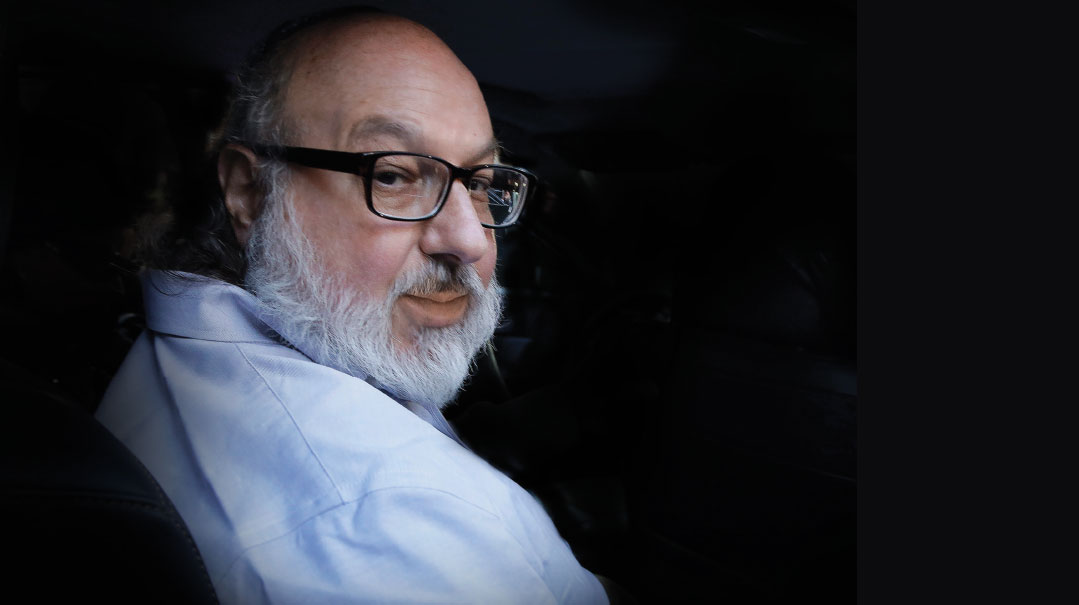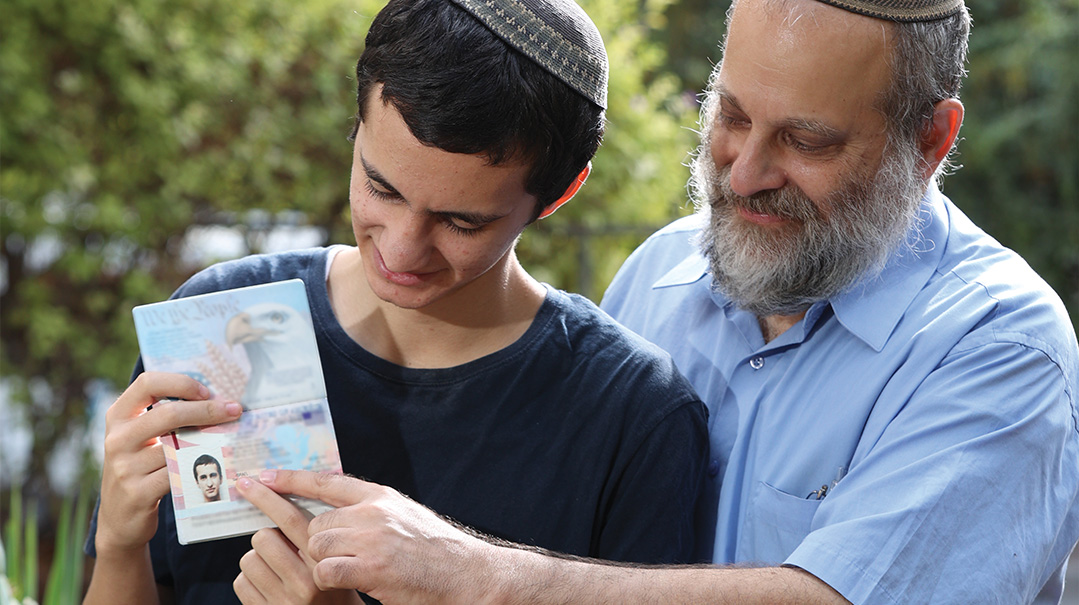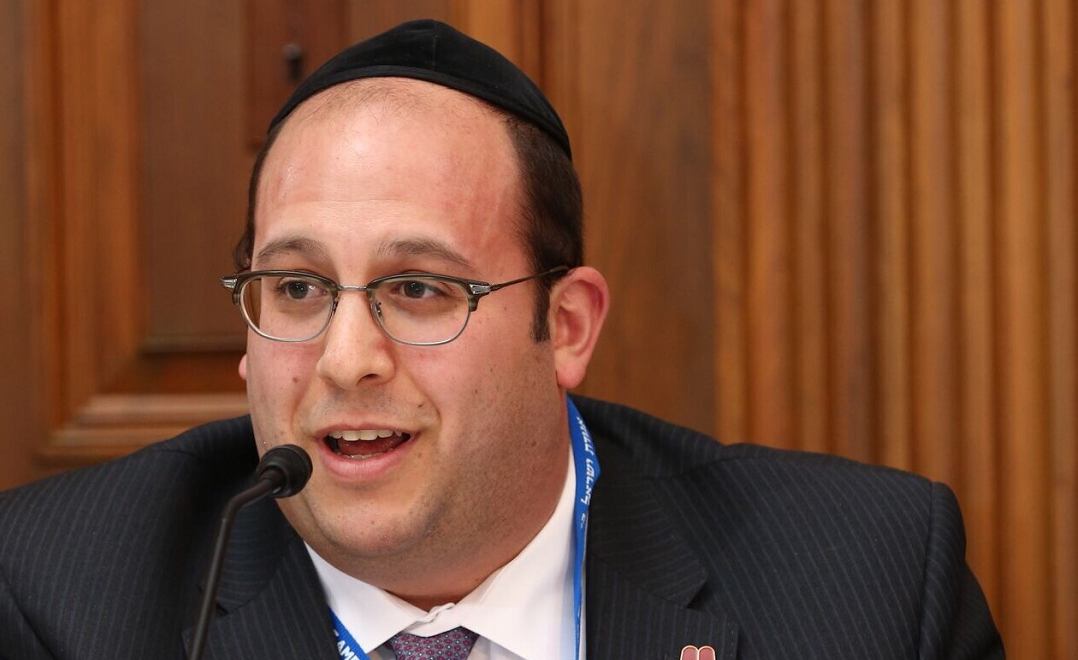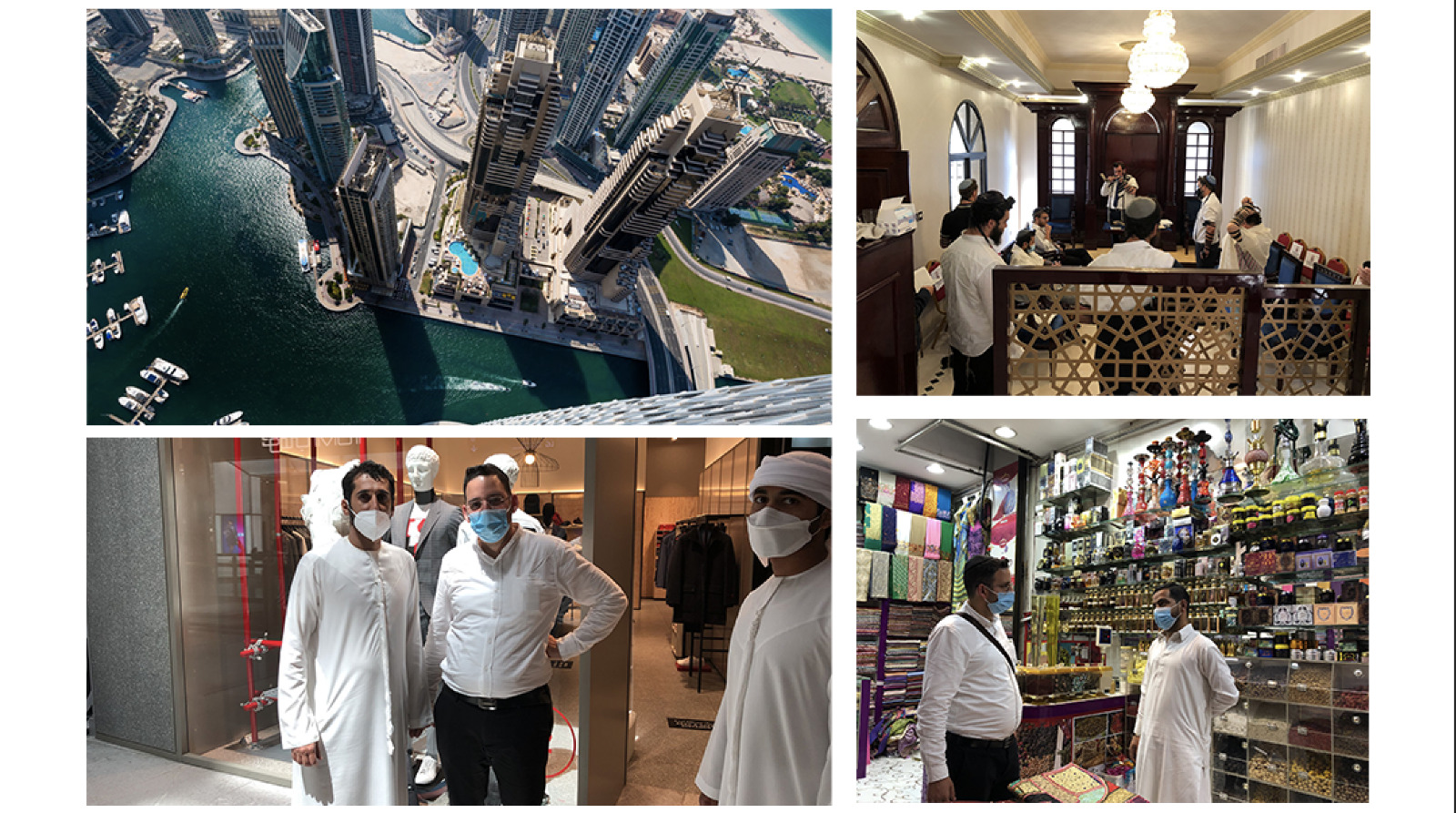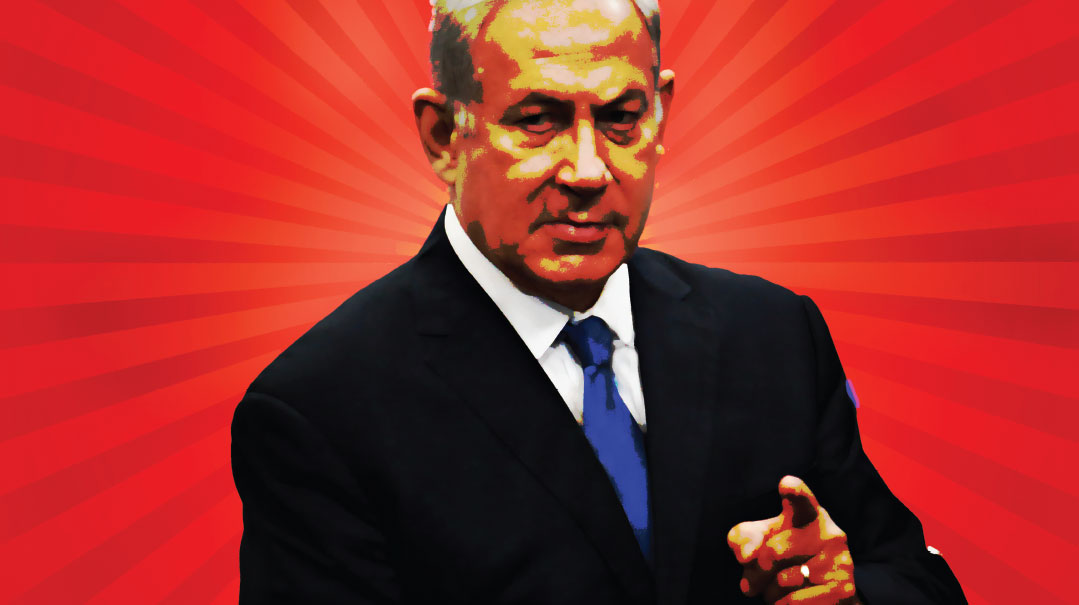Lone Soldier
| October 23, 2019Arab fighter Youssef Haddad goes to battle for Israel
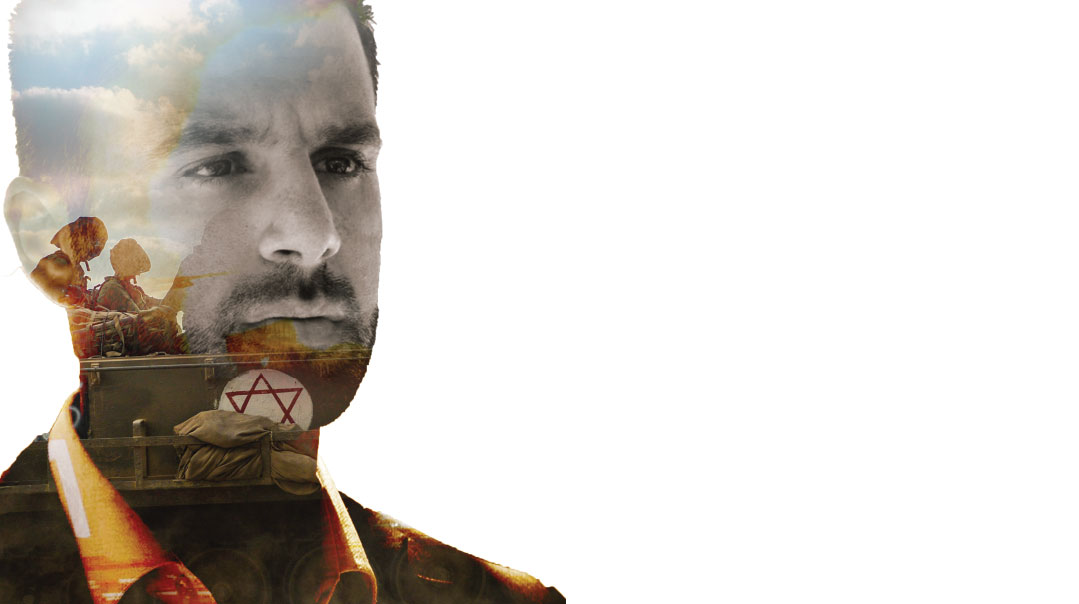
(Photos: Flash90)
Youssef Haddad always seems to be alone.
Whether it’s standing on stage in front of hostile university students as he fights BDS, or his decision as a Christian Arab teenager to join an elite IDF brigade, he’s always been a lone beacon of reason and conciliation amid hostility, hate, and even death threats.
And he’s alone when I meet him right before the recent Israeli elections — we’re both attending a Yisrael Beiteinu rally at the Daniel Hotel in Herzliya. He’s standing off in a corner of the posh lecture hall, cynically listening to Avigdor Lieberman’s anti-chareidi incitement. The audience, not an especially thoughtful or intellectual bunch, burst into rounds of applause at every phrase uttered against the chareidi community. Lieberman is greeted like a national hero returned from a victorious battle, and less like a right-wing resident of the yishuv of Nokdim who has come to cobble a few votes among the rich pensioners of Herzliya.
I spot Haddad off to the side, unmistakably an Arab, not seeming too pleased with Lieberman’s harsh words about the chareidim. “It’s amazing how this man has become the darling of the left,” he says as he turns to me in a gesture of camaraderie. “All you have to do is utter a few stock invectives against the chareidim, trash the prime minister a bit, and you’re a national hero in these people’s eyes.”
“You almost sound like an Agudah voter,” I say.
Haddad smiles. “Once we’re talking Agudah,” he remarks, “I just want to mention that the food here isn’t kosher enough for you. It’s the Herzliya rabbanut. The meat’s not glatt. But don’t worry, that just means we’ll have more time to talk.”
Tired of War
Youssef Haddad is an Israeli Arab from Nazareth, he is the son of a Christian-Arab minister, and he has dedicated his life to defending Israel’s reputation on the world stage. At 34, he’s in much demand among journalists in Israel and on news networks around the world. After all, an Arab who’s become a champion of Israel, even as a good number of Israelis themselves are not shy about condemning their own country’s policies as they ally with avowed enemies, is newsworthy.
“Every revolution starts with one naive person who dreams of changing the world,” he says.
Youssef grew up alongside Jewish Upper Nazareth, and had some Jewish friends. But when they turned 17 and got their induction notices, he was left out of the draft pool. True, he was an Arab and therefore exempt from military service, but he was also a patriot, and wanted to do something for the country he was grateful to be living in.
“The entire Arab population is undergoing a process of ‘Israelization,’ ” he says. “In truth, a significant part of the Arab community is tired of the wars and prefers to look ahead to a more secure future. The State of Israel is a fact, and we should be grateful for what it’s given us. Or we can just try out what it’s like living in Syria. Anyway, I wanted to give back to this country that had given me such a good life so far.”
Frustrated, Youssef contacted the army himself. “I wanted to get them to take me — I wanted to feel like a part of something and contribute to the state. The IDF is the most moral army in the world, and I was determined to be a part of it.”
In the end Haddad was given the opportunity to enlist. His medical profile was 97, considered a perfect score for the IDF — and his ticket to the elite Golani Brigade. He completed a squad commanders’ course with honors and was assigned to the 51st Battalion of Golani. But although he was living his dream, when he went home to Nazareth he faced a nightmare. “I would get teased, cursed, spat at,” he says. “They considered me a traitor.”
But even he couldn’t have predicted what his service would look like at the end.
Sitting Ducks
It was during the Second Lebanon War in the summer of 2006, just two days before the cease-fire between Israel and Hezbollah was announced, and Youssef’s squad was still reeling from a particularly painful loss.
Battalion commander Major Roi Klein Hy”d had lost his life in the battle of Bint Jbeil two weeks before. During a Hezbollah ambush, a hand grenade was thrown over the wall between some Hezbollah terrorists and Klein’s unit. Klein immediately pounced on the live grenade, his own body sustaining the full impact of the explosion, and saved his entire unit. As he jumped on the grenade, he shouted the Shema Yisrael prayer, and with his last breath, as his body was blown apart, ordered the soldiers who came to his aid to instead focus on another soldier who had been hit and had a real chance for survival. Klein’s death had a deep impact on Haddad, who called it “an act of inconceivable nobility that would not have occurred in any other army. The Jews are something special, and it strengthened my resolve that I was doing the right thing.”
Two weeks later, just before the cease-fire went into effect, Haddad’s unit heard a huge explosion — a nearby tank was struck by a Kornet anti-tank missile. “At about four thirty in the morning we were rocked by an explosion that shook the entire area,” Haddad recalls. “We understood that an Israeli tank had been struck, and we received orders to advance to the spot and execute a rescue operation.
“We were the closest forces to the tank, so we were sent to rescue the wounded, or what was left of them,” Haddad continues. “The rescue operation was complicated and took longer than anticipated. The tank commander was critically injured and covered with burns, and the rest were wounded to varying degrees. We laid the commander on a stretcher and performed the necessary first-aid steps to keep him alive, but we understood that he had to be evacuated immediately by helicopter for there to be a chance of his survival. We received instructions to meet the helicopter at a particular spot, and the plan was to get there before the sun rose, as there was less danger in the dark. We didn’t calculate the distance correctly though, and midway we found ourselves fully exposed by sunrise, like sitting ducks.”
Exposed and vulnerable, they were spotted by a Hezbollah ambush, which opened heavy fire on them. The Golani force tried to return fire, but the Hezbollah forces had the advantage of being on higher ground. At a certain point they fired another Kornet missile at the Israeli soldiers.
“The missile hit a wall just a few meters away from me,” remembers Haddad. “I was hurled in the air and my entire body was punctured with shrapnel. I knew something was happening, but I couldn’t wrap my mind around what it was.”
As Haddad lay on the ground, he realized that his foot had been blown off above the ankle. “You see it all like in a dream. On the one hand you’re there, but on the other hand you have no ability to feel anything or react. I saw that I had lost my foot and I started screaming. I had shrapnel in my arms, legs, and face. Some pieces of shrapnel went right through my body. One of the soldiers who was there later told me that the gash in my face was so deep a hand could fit in it.”
Haddad remained conscious throughout, clearly understanding that he was seriously injured. “I was treated on the spot by a reservist surgeon,” he remembers of the first minutes after the injury. “I heard him saying into his communication device that they should either send another helicopter immediately to pick up the wounded soldier, or send in forces later to pick up the corpse…. I felt a strong choking sensation, and I couldn’t utter a word.”
A second helicopter did arrive for his evacuation, but accessing it wasn’t easy. “Throughout the evacuation we were being shot at from every direction. They fired RPGs at us, missiles, rifles, and grenades. Once we were safe in the air, they gave me morphine and took me to a hospital in Nahariya. I knew I had to call my parents and tell them what happened, but I was petrified of their reaction. In the end, I told my father that I was injured but I was okay, that everything was fine.” Well, not exactly.
When Haddad woke several days later, he discovered that his foot had been reattached to his leg in a complicated surgical procedure, held in place by metal rods. “Between the shrapnel and the wound care, practically my whole body was covered with metal.”
Rehabilitation was long and painful, but Haddad was a fighter until the end. “I told the doctor, ‘One day I’ll play ball with this leg, you’ll see,’ but he just looked at me sympathetically. But I wouldn’t give up, and thanks to some amazing therapists and coaches, a year later I came back to the doctor and showed him how I could bounce a ball on my foot, in true Israeli soccer style.”
Condemned on Campus
While IDF veterans like Haddad are considered local heroes for putting their lives on the line for Israel’s survival, on college campuses and other platforms around the world, Israeli soldiers are demonized and degraded, accused of the most outlandish atrocities, and equated with the most barbaric insurgents. (For example, on campuses today, students are fed stories of how IDF soldiers routinely harvest organs from Palestinians — dead and alive — and transplant them into Israelis.)
It’s hard to combat such an onslaught, but that’s why Haddad joined a group called Reservists on Duty, which challenges the falsehoods and prejudices by bringing Israeli veterans to campuses. During every “Israel Apartheid Week” and other hostile times, these “reservists” are called to action to engage the students and expose them to real IDF vets, not the monsters that have been painted by active campus lobbies such as the Israeli organization Breaking the Silence and others of their ilk.
And one of the biggest surprises for these students is Youssef Haddad, wounded IDF veteran — and a proud, unabashed Arab.
“We have so many enemies all around us who want to destroy us, and the most painful is when this defamation comes from within,” says Haddad. “I’m there to tell them: I served in the most humane and moral army in the world, with the highest code of ethics and human values. The IDF is an army that will bend over backward to save lives and ensure that innocent individuals are not harmed — even if they’re the enemy.”
At Harvard University, following a recent “Breaking the Silence” evening, Youssef Haddad again stood alone. On this prestigious America platform, students are having a hard time accepting what he says — it goes against everything they’ve been programmed to believe. Everyone here “knows” that Israel is an apartheid state. They are convinced that Israel — a conquering state with one of the most brutal armies in the world — was built on the backs of the downtrodden Palestinian masses. From their perspective, you don’t need to live in Israel to know that the IDF rules the Palestinians with an iron hand, oppressing them cruelly and terrorizing them into submission. To them, these are incontestable facts. Hundreds of Palestinians are humiliated at Israeli checkpoints every day, they are massacred by the thousands by Israeli troops who mindlessly obey orders or are thrown into prisons in subhuman conditions. Nor can they possibly ignore the hundreds of children left without a roof over their heads after every Israeli airstrike in Gaza.
And then Haddad appears before them, telling the opposite story. “The Palestinian nation is stuck in the past instead of looking forward to the future,” he says, trying to raise his voice against the rumblings in the audience. “Instead of establishing an economy, building up their infrastructure, and investing in health services, they choose to encourage terrorism and live by the sword. The blood bath they’re leading is what is hurting them — they’re hurting themselves.”
His arguments encounter a brick wall. The audience here understands what he’s saying — it’s not intelligence that’s lacking. It’s just that they’re incapable of accepting what he says as the reality. No single lecture, intriguing as it may be, can destroy the illusions drummed into them by the international press every day for years. For them, a lecture is one thing, reality another.
After about 20 minutes, however, something starts to shift. Patches in the crowd begin to soften. Then one of the students decides to interrupt. “Why should we believe you?” he yells. “You’re an Israeli Jew. Of course you’ll try to defend your country and do anything to conceal its human-rights violations.”
But the Israeli lecturer doesn’t flinch. “Maybe I didn’t introduce myself properly,” he turns apologetically to the crowd. “My name is Youssef Haddad, and I’m an Israeli Arab. I’m one of them. If I were a Jew, I wouldn’t expect you to believe me.”
Dead silence fills the hall.
“A large part of the Palestinian people already understands that its best option is to be part of Israel,” he continues. “As an Israeli Arab I can say unequivocally that my life is better than it would be anywhere else in the Middle East. In contrast to the countries surrounding us, Israel is the only country to have built a stable economy, advanced health services, and cutting-edge technology. Those who refuse to be part of this will find themselves going backward instead of forward. The time has come for the Arab population to understand that the language of violence doesn’t work anymore. You know, when the Hezbollah terrorists tried to kill me, they thought I was a Jew. I don’t believe the terrorist who fired that missile was thinking about social liberty.”
Responsible for Each Other
Haddad is convinced that the real losers in the regional conflict are the Palestinians who are raised to hate. “Even now,” he says, “the Arab Joint List for the Knesset is just a big bluff. A total sham. They aren’t in the Knesset to be part of it and represent their constituents, but to deepen existing divisions.”
He’s quick to qualify that his vision of peace has nothing to do with social intermingling or intermarriage. “This is a purely socio-political perspective — instead of continuing to fight reality, Israeli Arabs should gratefully take what the state has to offer and give back what they can in return.”
I ask him if he isn’t being naive. “Look,” I say, “Israel has been trying to explain the situation for so many years. We sent one of the best orators in Israeli history, Binyamin Netanyahu, to the United Nations 35 years ago, but we still don’t have ambassadors from Saudi Arabia and Bahrain. The hatred for Israel is still alive and well and it seems that a thousand years of positive PR won’t change anything. Why do you think that your activism will manage to make a dent?”
In response, Haddad shares a story that happened at one of his lectures.
He was once lecturing in Toronto before a large crowd, and began to explain how organizations like BDS, B’Tselem, and Breaking the Silence are doing the opposite of bringing peace. Their activism fans hatred and resentment and decreases Arabs’ desire for peace. The students at this lecture were willing to pay attention because this wasn’t, in their opinion, just another whitewashed Jewish polemic. The man standing before them was an Arab through and through.
“At the end of the lecture,” Haddad remembers, “I asked everyone in the audience who had heard that Israel is an apartheid state to stand up. Half of the hall was on its feet. When I asked if they had heard that the IDF violates human rights, not one person remained sitting. I told them that’s exactly the reason why I do what I do. They demonstrated both to me and to themselves just how indispensable it is to hear the other side.”
Haddad’s deep desire to bring about structural change in Arab society is shared by his father, a Christian clergyman, and many of his family members — but aside from that inner circle, his outspokenness for change has often placed him in extremely uncomfortable situations. “When I was in the army,” he says, “I got permission to return home in civilian clothes without my weapon, in order not to attract negative attention. But I preferred not to surrender to intimidation. I walked in my uniform with my head held high and, over time, the locals got used to it.”
Haddad has formed an organization for his outreach efforts, called “BeYachad — Aravim Zeh la-Zeh,” and he explains that the name came from none other than his beloved commander, Roi Klein.
“Back when I was in Golani, I was once squatting next to him in an ambush position we had built and he told me that in Judaism there’s a concept of ‘kol Yisrael areivim zeh lazeh’ (all Jews are responsible for one another). It was really his motto in his life, and in his death — that every soldier is responsible for the lives of everyone who serves together with him. Afterward I realized that if you change the vowels, it becomes ‘Aravim’ (Arabs). This double meaning is really the point.”
Equipped as he is with three languages, great oratorical talent, and a sincere wish to bring change, Haddad, who works as a market researcher for his day job, says he’s convinced that a big shake-up in Arab society is around the corner. “Many people who were opposed to me at first are now volunteers in my organization,” he says. “So something is shifting. You know, change happens slowly. But in my view, it’s starting.” —
(Originally featured in, Issue 782)
Oops! We could not locate your form.







